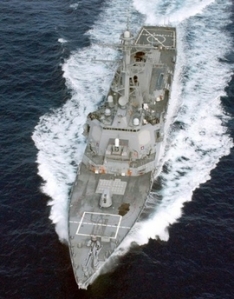Russia Negotiating with Cuba to Open Naval Base
July 27, 2012
REUTERS | JULY 27, 2012
Russia hopes to establish its first naval base abroad since the 1991 collapse of the Soviet Union and is looking at Cuba, Vietnam and the Seychelles as possible locations, state-run RIA news agency quoted the navy chief as saying on Friday.
Russia has been increasing the reach of its navy in recent years, sending warships further afield as part of an effort to restore pride project power in a world dominated by the U.S. military.
“It’s true that we are continuing work on providing the navy with basing outside the Russian Federation,” RIA quoted Vice Admiral Viktor Chirkov as saying in an interview.
The Soviet Union had a large naval base in Communist ally Vietnam but post-Soviet Russia opted to vacate the Cam Ranh base in 2002, during President Vladimir Putin’s first Kremlin term, because rent payments were a burden on state coffers.
The fate of Russia’s only naval facility outside the former Soviet Union, a maintenance and supply facility in the Syrian port of Tartous, is uncertain because of the conflict in Syria.
Chirkov said Russia was “working out the issue of creating sites for material and technical support on the territory of Cuba, the Seychelles and Vietnam,” RIA reported.
Chirkov’s wording suggested facilities in those countries might be less extensive than full-scale naval bases. Navy officials could not immediately be reached for comment.
Vietnamese President Truong Tan Sang, who was in Russia and was to meet Putin on Friday, was quoted as telling a Russian radio station that Vietnam has “no intention of cooperating with any country with the aim of military use of the port of Cam Ranh”.
However, Sang was quoted as telling Voice of Russia radio that a maintenance and service facility at the port would be open to ships from all nations and that, in the interest of furthering a “strategic partnership” with Moscow, Vietnam “will provide Russia with advantages in Cam Ranh, including with aim of developing military cooperation”.
